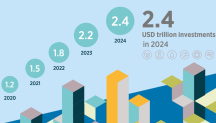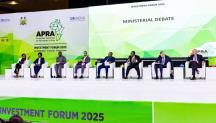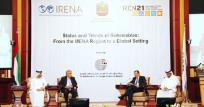

MENA renewable energy capacity set to grow 60-fold by 2030
Newsletter
The International Renewable Energy Agency (IRENA), in coordination with the Ministry of Foreign Affairs of the United Arab Emirates and the Renewable Energy Policy Network for the 21st Century (REN21), held a policy discussion on Sunday on a new report that indicates massive growth in the renewable energy markets in the Middle East and North Africa.
Regional investment topped US$2.9 billion in 2012, up 40% from 2011 and 650% from 2004. With over 100 projects under development, the region could see a 450% increase in non-hydro renewable energy generating capacity in the next few years. Further to this, MENA governments have announced additional non-hydro renewable energy capacity of 50GW by 2020 and 107 GW by 2030, which compares with 1.7GW today.
IRENA, REN21 and the UAE Ministry of Foreign Affairs presented the findings of the report, “Status and Trends of Renewables: From the MENA Region to a Global Setting”, at a policy discussion at the Emirates Center for Strategic Studies and Research (ECSSR). The MENA report was released in Paris and Abu Dhabi on 3 June, in association with the launch of REN21’s Renewables 2013 Global Status Report.
“The MENA Renewables Status Report provides unparalleled insights into the MENA region, an emerging renewable energy champion. In just the last two years, renewable energy has transformed from a niche interest to a regional phenomenon reaching almost USD 3 billion investment in 2012 alone,” stated Arthouros Zervos, Chair of REN21.
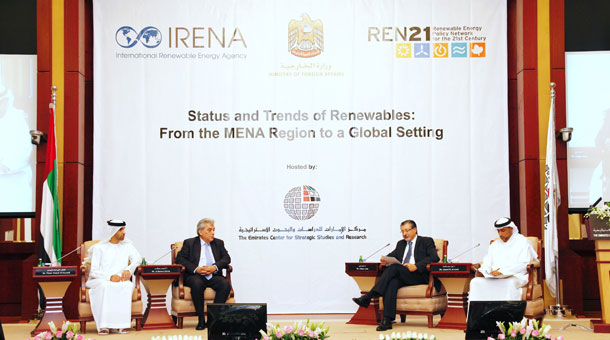
(L to R) Dr. Thani Al Zeyoudi, Director, Directorate of Energy and Climate Change of the Ministry of Foreign Affairs of the UAE, Arthouros Zervos, Chair, REN21, IRENA Director-General Adnan Z. Amin and Ahmad Al Astad, Director of the ECSSR Conferences Department
The report provides a status overview of renewable energy markets, industry, policy and investment trends in the region, drawing on the most recent data available, provided by a community of over 50 contributors and researchers in the region.
The report notably tracks a sea-change in the renewable energy plans of net oil-exporting countries, which now account for over 80% of the region’s announced 107 GW capacity additions.
“This report demonstrates that the MENA region is rapidly taking a prominent role in accelerating the adoption of renewable energy,” said HE Dr. Sultan Ahmed Al Jaber, UAE Minister of State and CEO of Masdar. “The UAE is committed to investing in renewable energy and has a goal of diversifying its energy sources while capitalizing on the economic and social opportunities those investments present. Masdar’s recent inauguration of the 100 MW Shams 1 concentrating solar plant in Abu Dhabi is a major milestone in achieving this goal as well as a significant step for renewable energy in the region. With our experience domestically and internationally, we look forward to contributing to the renewable energy sector’s growth in the MENA region.”
Policy deployment and target-setting are a widespread phenomenon across the region. All 21 MENA countries now have policy targets, up from 5 in 2007, with at least 19 countries having technology specific targets. To achieve these targets and attract investment, 18 MENA countries had enacted at least one renewable energy enabling policy by early 2013, such as feed-in tariffs (FITs), net metering, fiscal incentives, and public financing.
“From IRENA's headquarters in Abu Dhabi, we have been uniquely placed to witness renewable energy become a multi-billion dollar industry within the MENA region, said Adnan Z. Amin, Director General of IRENA.
"The MENA region's commitment to renewable energy is inspiring and further strengthens IRENA’s own regional work programme to better support and accelerate the regions' uptake of renewable energy," he said.
“Since 2008, modern renewable energy production has grown at a much faster rate than fossil fuels, and, with 106 renewable energy projects currently in the pipeline, this trend is likely to continue. By implementing ambitious targets, and enabling strong regulatory and institutional frameworks, governments across the region are driving the growth of renewable energy, and showing growing recognition of its broad macro-economic benefits," Mr. Amin added.
However, several challenges need to be addressed to reduce reliance on public and soft financing, and to foster greater private investment. These include regulations and market-based policies, energy pricing, public awareness, financial uncertainty, and policy risk.
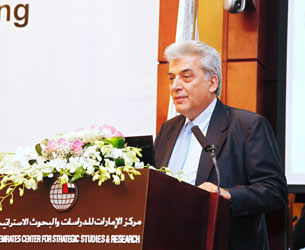
Arthouros Zervos, Chair REN 21 |
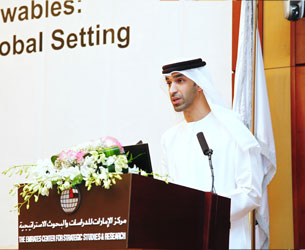
Dr. Thani Al Zeyoudi, Director, Directorate of Energy and Climate Change of the Ministry of Foreign Affairs of the UAE |
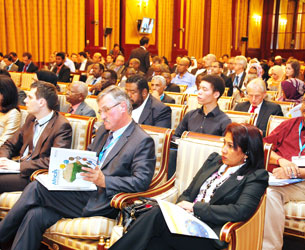
Participants |
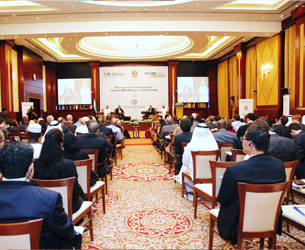
Participants |
Additional Highlights
Renewable energy has grown strongly in the MENA region since 2008. Electrical production from non-hydro renewable energy more than doubled between 2008 and 2011, and now accounts for just under 3TWh, gaining market share over fossil fuels despite strong growth in electricity demand in the region. As of April 2013, more than 100 projects totalling over 7.5 GW of new renewable capacity were in the pipeline (excluding hydro), this represents almost a 4.5 fold increase over existing non-hydro renewable capacity.
After hydro, wind is the largest renewable power source in the region with a total capacity of 1.1 GW by the end of 2012 across 8 countries. However, solar power generation has been growing more rapidly, first through photovoltaic (PV), with an annual average growth rate of 112% from 2008-2011, and more recently with the commissioning of large concentrating solar power (CSP) plants in Algeria, Egypt, Iran, Morocco, and the UAE. This trend is expected to continue in the foreseeable future.
Solar Hot Water Heating accounts for about 9 million square meter (m²) of collector area, representing 6.3 gigawatts-thermal (GWth) of installed capacity, most of which is in net oil importing countries where successful promotional schemes, in particular the PROSOL and PROMASOL programmes in Tunisia and Morocco, are based.
Great strides have been made in rural electrification in the region, electrification rates are now above 99% in more than half of the countries. However, rural areas remain under served in some countries, including Djibouti and Yemen.
There is growing interest in developing the renewable energy value chain in the MENA countries, with several countries having developed policies to stimulate local manufacturing and innovation, especially for solar and wind. This interest is particularly strong in Saudi Arabia, the United Arab Emirates, Egypt, Morocco, and Tunisia. Alongside favourable policy frameworks, a large focus has been placed on the establishment of various education, training and research institutions to develop local expertise and technological capabilities with respect to production, project execution, and innovation capabilities.
Institutions based in the MENA region are playing a significant role in accelerating the expansion of renewables within the region and across the world. Among them are the International Renewable Energy Agency (IRENA) based in Abu Dhabi, the Regional Center for Renewable Energy and Energy Efficiency (RCREEE) in Egypt, and MASDAR, also in Abu Dhabi.
